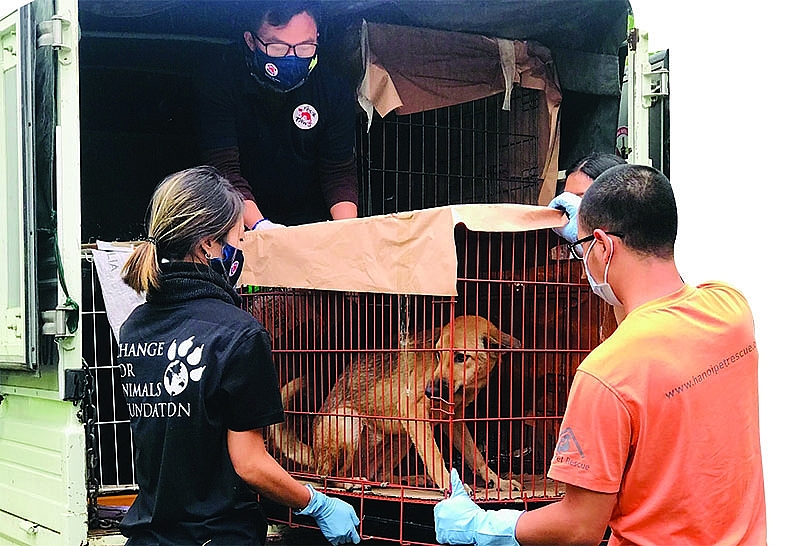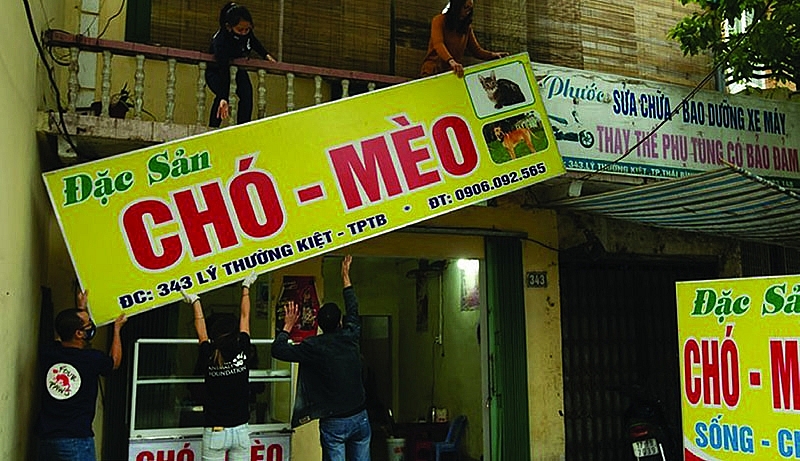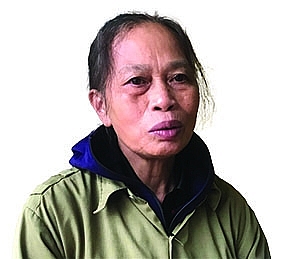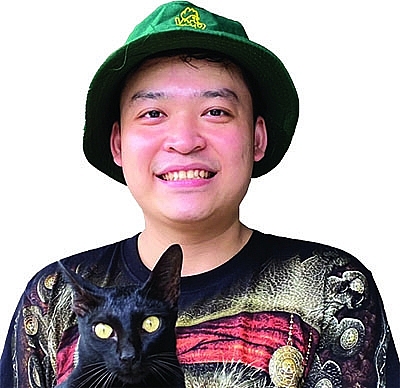The journey to rescue dogs and cats in Vietnam
 |
| The journey to rescue dogs and cats in Vietnam |
On a cold drizzly day at the end of 2020, while everyone was rushing to complete the unfinished work of the old year and preparing to start anew in 2021, around a dozen members of animal protection organisations in Vietnam were assisting the owners of a dog and cat meant restaurant in Thai Binh city remove the signboard and bring the 25 dogs and cats into special care.
Ninh Thi Phuong Thao, programme advisor at Four Paws, an international animal protection organisation with branches in 15 countries, said the success in Thai Binh has been a special turning point for not only Four Paws but also other animal protection organisations because this was the first time they managed to persuade the owner of a dog and cat restaurant to quit. The victory was made even sweeter for it taking place in Thai Binh – the citadel of cat meat trade in Vietnam.
Goodbye from a cat meat restaurant owner
Located in the city’s Tran Lam ward, Pham Van Duong’s restaurant was well-frequented by locals and tourists alike, who came to enjoy a dish considered the local specialty: cat meat. Although the store opened only a year ago, Duong has seven years of experience in trading dog and cat meat and has owned two large restaurants dealing in these types of meat in Thach That district of Hanoi.
Duong said that every day he got up at 4am to slaughter the animals and begin preparing the meals for patrons. “I studied music and my wife studied accounting, but we both ended up slaughtering and selling dog and cat meat. For seven years, I never thought I would do this job for long because it was cruel. Every time I have to slaughter an animal, I always ask myself: Why do I kill it? Yet to maintain our lives and raise two children, I could not give it up.”
Each month, about 240 animals were consumed at his shop, mostly cats, fetching him VND40-50 million ($1,700-$2,200) a month. While this business helped secure the life of his family, it has also inflicted him with tremendous psychological trauma and has come at the expense of his personal life. The holidays, which are a time for spending quality time with their children, are the busiest days at the store when he has to slaughter the most animals.
The most taxing, however, is the fear that his two children would walk in on their father doing the job of an executioner. “I cannot let my children see that scene, it would scar them forever,” he said.
The Four Paws volunteers arrived to tilt the scales of his emotional turmoil, gently urging them to change business model.
“Four Paws helped me make up my mind once and for all. Just five days after their visit, I announced that the store would be closed, to the surprise of my friends and customers.”
With both physical and mental support from the volunteers, Duong’s restaurant was turned into a shop selling electric and used motorbikes, which opened in January. At the end of December, the signboard of the restaurant “Specialty Dog - Cat” hung by his own hands more than a year ago was removed and smashed to pieces. “I feel happy and a bit emotional. This is a sacred and meaningful moment for me,” Duong confided.
Although not the first case, Duong’s restaurant was the first specific one widely mentioned by the media. Before that, nearly 50 dog meat stalls running along Nhat Tan street in Hanoi’s Tay Ho district also closed even though they were doing very well. From a famous street which was “the capital of dog meat” with 30-year-old restaurants lying close together and attracting diners from far and wide – now Nhat Tan has only one dog meat store. According to many people living in Nhat Tan, in recent years as land in the area increased in price, most dog meat shop owners sold land to switch business or move elsewhere to live.
In 2018, Hanoi proposed to eventually limit people from eating dog meat, and many urban districts of Hanoi could see a complete ban in the trade, causing the “Nhat Tan dog meat brand“ to gradually fade into the past.
 |
Large-scale rescue campaign for dogs and cats
The success of closing the first dog and cat meat restaurant has been a rallying cry for Four Paws members and other animal protection organisations in Vietnam to double efforts to rescue dogs and cats.
Ninh Thi Phuong Thao from Four Paws said that after the restaurant closed, 20 cats and 5 dogs were taken from the store to the Four Paws Bear Sanctuary Ninh Binh for health checks before placing them at animal rescue stations in Danang and Hoi An to look for new homes.
She asserted that she was very lucky to have met the right people at the right time and could persuade them to give up. Because even though offering consultancy and supporting business households throughout the change, Four Paws members have always had their work cut out for them. So far, they have only successfully persuaded one shop owner in Vietnam and two others in Cambodia.
“Most restaurant owners go into this business for profit. Just like Duong, there are people who are not interested in trading cat and dog meat – they may be even repulsed by it – but profit and securing your family life are difficult to argue with,” she said.
Beginning mainly from the northern provinces, the trade of dog and cat meat gradually gained traction across Vietnam in past year and is not considered illegal due to belief held by some that the meat has many health benefits as well as the centuries-old superstition that it brings good luck.
According to Four Paws research, a kilogramme of dog meat fetches between €6-9 ($7-10). Cat meat, meanwhile, can cost up to €11 ($13) per kg – and even up to €20 ($24) in the case of a black cat.
The situation costs the lives of millions of animals each year, and has also become a concern for millions of dog and cat owners as a large number of the slaughtered animals are home-raised.
“Each year, millions of dogs and cats – both healthy and sick, owned and stray – are violently captured on the streets of Vietnam, crammed into tiny cages, and transported unchecked across the country, often for days. This is not only incredibly cruel to the animals, but also a blatant violation of public health recommendations, especially in times like these,” says Dr. Katherine Polak, veterinarian and head of Four Paws Stray Animal Care in Southeast Asia.
As more Vietnamese people are now keeping pets, there is a perceptible rise in the number of people coming to think of these animals as companions and saying a firm “No” to their meat. This trend is reinforced by the rising demand for clean and healthy food. The unsanitary conditions during transport as well as in slaughterhouses and restaurants, which often keep a wide variety of species for slaughter, serve as a petri dish for zoonotic diseases like COVID-19 and has been linked to outbreaks of rabies and cholera.
To put a sustainable end to the cruel dog and cat meat trade in Southeast Asia, Four Paws has also launched a campaign on an international and national level. More than one million people worldwide have already signed the petition to end the dog and cat meat trade, including 200,000 Vietnamese in late 2019.
After the rescue programme in Thai Binh city, the representative of Four Paws Vietnam said they would organise other activities such as coordinating with the dog and cat protection associations or cat protection alliances (such as Change for Animals Foundation, Hanoi Pet Rescue, Paws for Compassion, and Vietnam Cat Welfare) to conduct communications campaigns to alter people’s perceptions, rescue stolen pets and animals awaiting slaughter, and improving the welfare regime for these animals.
The main objectives of these campaigns will be education and cooperation with the responsible authorities and tourism associations to urge governments to introduce and enforce legislation banning the dog and cat meat trade to protect both animals and public health. In addition, in Four Paws supports local communities with humane and sustainable dog and cat population management programmes.
“Our ultimate goal is to eliminate the consumption of dogs and cats in Vietnam and then around the world,” said Thao.
| Pham Thi Hue - Thai Binh province
I really like dogs and cats so I never eat them. From the day my daughter and son-in-law switched to the dog and cat restaurant business, I never visited their store because I didn’t want to see those poor animals killed. I often petted, fed, and talked to the dogs and cats they brought home to raise for slaughter, so they also loved me very much. I regularly urged my children to quit this profession and I feel it’s a blessing to see these animals have a chance to live on. Nguyen Xuan Son - Chairman, Vietnam Cat Association
We have participated in two cat rescue programmes in the central region during the floods. Programmes like these have contributed to raising public awareness about protecting and improving the welfare of dogs and cats in Vietnam. This is also the mission of the Vietnam Cat Association and the Vietnam Animal Welfare Association so that Vietnamese people and international friends will have a better thinking about dog and cat meat consumption. Josef Pfabigan - CEO, Four Paws
We call for a complete cessation of trade, rather than management and regulation, because we have witnessed the miserable reality of domestic animals. Management and regulation are not ways to end animal suffering and there will still be real and unnecessary threats to public health. We envision a world where dogs and cats are no longer slaughtered for meat, where both citizens and governments understand the potentially serious threats and act together against the trade. |
What the stars mean:
★ Poor ★ ★ Promising ★★★ Good ★★★★ Very good ★★★★★ Exceptional
Related Contents
Latest News
More News
- Dong Ho folk painting added to UNESCO’s urgent safeguarding list (December 11, 2025 | 18:09)
- Conference focuses on switch from dog and cat meat trade to sustainable, safe jobs (December 11, 2025 | 12:13)
- 3F Plus clean pork amazes Michelin-starred chefs (December 09, 2025 | 12:15)
- The Rhythm of Blues – Colours of the Year 2026 (December 06, 2025 | 12:10)
- Pan Pacific Hanoi kicks off 2026 art awards celebrating young and disabled artists (November 06, 2025 | 18:25)
- PREP AI Language Fair 2025 highlights AI-powered language learning (November 03, 2025 | 09:00)
- Hanoi strengthens rabies control and supports transition of dog and cat meat trade (October 28, 2025 | 18:09)
- World-famous Gaia Earth installation touches down at UNIS Hanoi (October 07, 2025 | 13:40)
- Sidecar passion drives Vietnamese motor enthusiasts wild (September 05, 2025 | 09:00)
- Sheraton Saigon unveils artistic mooncake collection for 2025 (August 08, 2025 | 09:00)




 Tag:
Tag:
















 Mobile Version
Mobile Version